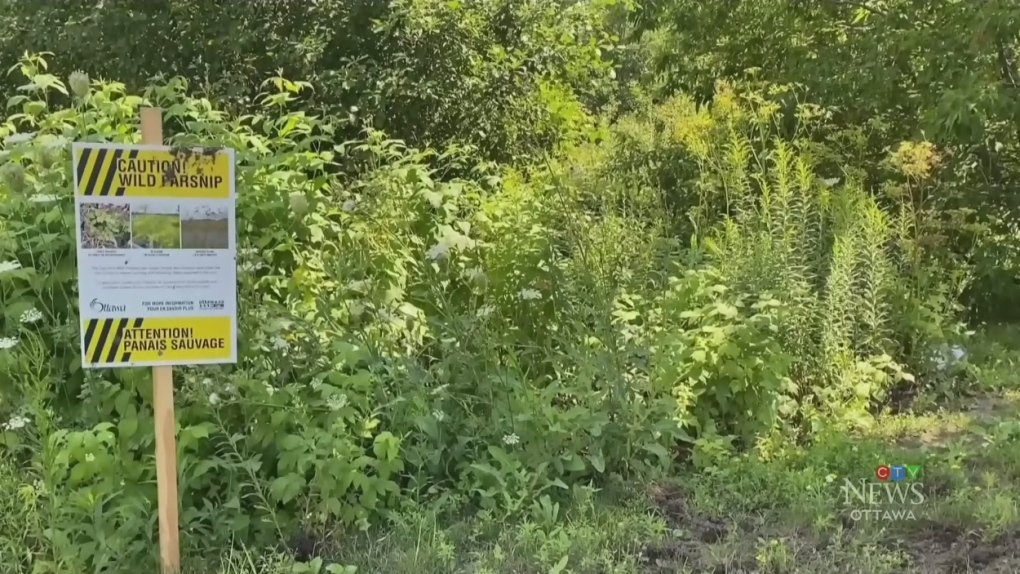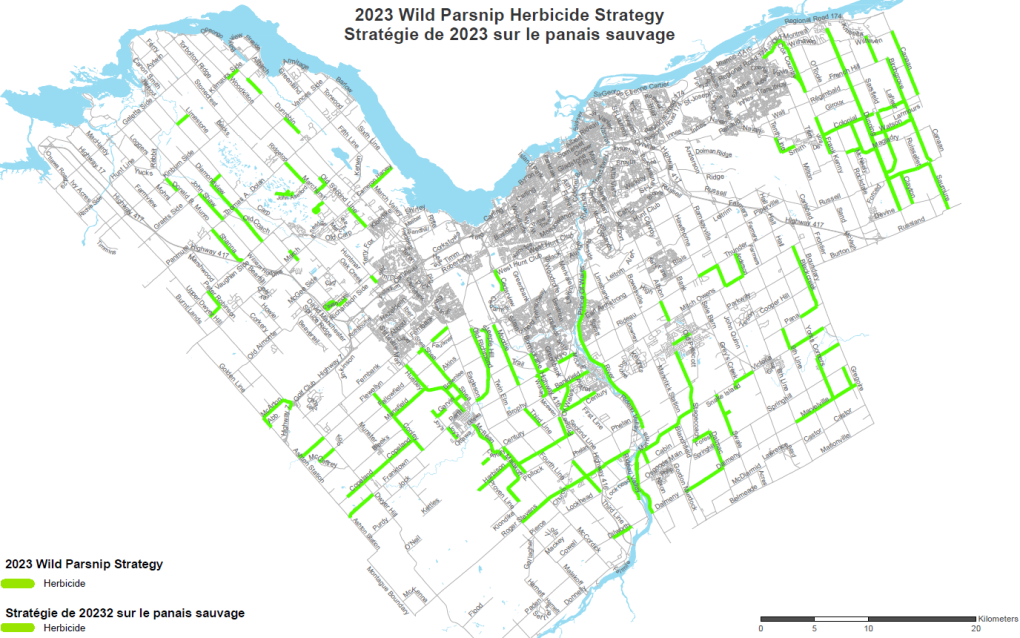Ottawa to begin spraying and mowing wild parsnip in suburban and rural areas

The city of Ottawa will begin spraying and mowing roadsides, pathways and parks this week to deal with wild parsnip, the invasive plant that can cause skin and eye irritation and make the skin prone to burning and blistering.
Approximately 650 lane kilometres of roadsides and pathways and over 200 park locations in suburban and rural areas will be treated with herbicides and mowed over the next few weeks and months.
"The goal is to reduce the growth of wild parsnip in highly infested areas while ensuring that environmentally sensitive areas and public safety are not adversely impacted," Allison Wilson, manager of technical operations with Public Works, said in a memo to Council.
In addition to the application of herbicides in highly infected areas, staff will continue, "mowing operations, adjusting frequency and timing to best coincide with herbicide applications."
Wilson says a "Notice of Herbicide Use" advertisement will appear in local newspapers one week prior to the start of spraying in public locations. Signs will also be posted every 100 metres along pathways and parks.
The Wild Parsnip Program will begin on Monday, with spraying in city parks to begin on June 6, weather permitting. Roadside grass cutting will also begin in early June.
The city will spend $298,000 to deal with wild parsnip this spring and summer.
Wild parsnip has been identified as a noxious weed in Ontario since Jan. 1, 2015.
Rural property owners can ask the city not to spray the areas adjacent to their property.
"Should a resident opt-out of the program, it will become their responsibility to manage any wild parsnip infestation adjacent to their property, as required by the Weed Control Act, 1990," Wilson says.
 The city of Ottawa released a map outlining where herbicides will be sprayed along roadsides/pathways and parkland to deal with wild parsnip. (City of Ottawa/memo)
The city of Ottawa released a map outlining where herbicides will be sprayed along roadsides/pathways and parkland to deal with wild parsnip. (City of Ottawa/memo)
Identifying wild parsnip
Wild parsnip is a highly branched plant, with hollow green stems, according to the city of Ottawa's website.
"It has two growth stages: non-flowering leafy rosettes at ground level and 0.5 to 1.5 metre-tall flowering plants."
The city outlines the stages of growth for wild parsnip on its website:
- Early growth: In the first year of growth, low-growing non-flowering rosettes of leaves form with a cluster of spindly, compound leaves that resemble celery leaves.
- In bloom: When wild parsnip is in bloom, usually in the second and third-year plants have tall, branched yellow flowering stalks that usually bloom in early June to late July.
- Mature plant: Starting in August the blooming plant will begin to turn brown and the leaves and stems will begin to dry up. This means that the toxic sap from the plant will also begin to dry up, and contact with the plant is less likely to cause a reaction.
How to avoid the plant
The city of Ottawa offers the following tips to avoid wild parsnip on pathways and in parks:
- It is recommended that the public stay on the groomed areas of parks, roadsides and pathways where there are less instances of wild parsnip.
- When working around wild parsnip or when walking through dense vegetation, wear goggles, gloves, long pants and long-sleeved shirts.
- Children should be reminded not to pick wild flowers
- If you are exposed to the plant sap, wash the contaminated area(s) thoroughly as soon as possible, and seek medical attention if skin irritation occurs
CTVNews.ca Top Stories

Young people 'tortured' if stolen vehicle operations fail, Montreal police tell MPs
One day after a Montreal police officer fired gunshots at a suspect in a stolen vehicle, senior officers were telling parliamentarians that organized crime groups are recruiting people as young as 15 in the city to steal cars so that they can be shipped overseas.
Mandisa, Grammy award-winning 'American Idol' alum, dead at 47
Soulful gospel artist Mandisa, a Grammy-winning singer who got her start as a contestant on 'American Idol' in 2006, has died, according to a statement on her verified social media. She was 47.
Man sets self on fire outside New York court where Trump trial underway
A man set himself on fire on Friday outside the New York courthouse where Donald Trump's historic hush-money trial was taking place as jury selection wrapped up, but officials said he did not appear to have been targeting Trump.
Sask. father found guilty of withholding daughter to prevent her from getting COVID-19 vaccine
Michael Gordon Jackson, a Saskatchewan man accused of abducting his daughter to prevent her from getting a COVID-19 vaccine, has been found guilty for contravention of a custody order.
She set out to find a husband in a year. Then she matched with a guy on a dating app on the other side of the world
Scottish comedian Samantha Hannah was working on a comedy show about finding a husband when Toby Hunter came into her life. What happened next surprised them both.
Shivering for health: The myths and truths of ice baths explained
In a climate of social media-endorsed wellness rituals, plunging into cold water has promised to aid muscle recovery, enhance mental health and support immune system function. But the evidence of such benefits sits on thin ice, according to researchers.
'It could be catastrophic': Woman says natural supplement contained hidden painkiller drug
A Manitoba woman thought she found a miracle natural supplement, but said a hidden ingredient wreaked havoc on her health.
Manitoba mom praises quick-thinking fire department for freeing daughter stuck in playground equipment
A Manitoba mother is praising firefighters for their quick work in helping her daughter who got stuck at a playground in Lorette, Man.
The Body Shop Canada explores sale as demand outpaces inventory: court filing
The Body Shop Canada is exploring a sale as it struggles to get its hands on enough inventory to keep up with "robust" sales after announcing it would file for creditor protection and close 33 stores.
































